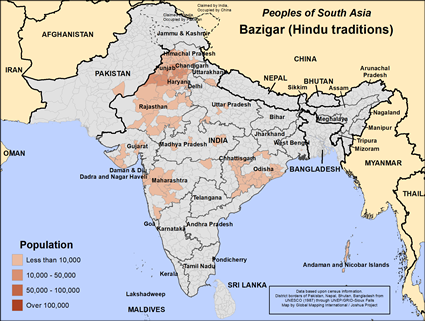Bazigar (Hindu traditions) in India

Photo Source:
Anonymous
|

Map Source:
People Group data: Omid. Map geography: UNESCO / GMI. Map Design: Joshua Project.
|
| People Name: | Bazigar (Hindu traditions) |
| Country: | India |
| 10/40 Window: | Yes |
| Population: | 332,000 |
| World Population: | 332,000 |
| Primary Language: | Punjabi, Eastern |
| Primary Religion: | Hinduism |
| Christian Adherents: | 0.00 % |
| Evangelicals: | 0.00 % |
| Scripture: | Complete Bible |
| Ministry Resources: | Yes |
| Jesus Film: | Yes |
| Audio Recordings: | Yes |
| People Cluster: | South Asia Hindu - other |
| Affinity Bloc: | South Asian Peoples |
| Progress Level: |
|
Introduction / History
The HJindu Bazigar or Goaar live across many areas of India. Their name comes from the Urdu word "bazi" which means acrobat. The traditional occupation of the Bazigar was that of being acrobats, dancers, musicians, jugglers and wrestlers. The Bazigar would travel from village to village. They would hire themselves out as farm agricultural laborers. They would also perform at festivals and holidays as dancers, drummers and acrobats. They would perform for Hindu, Muslim and Sikh villages.
Today less than one out of five Bazigars engage in the itinerate lifestyle. Most have settled down and work in agriculture. They still like to dance, sing, play music and do feats of strength and agility. The Bazigars have been classified as a Scheduled Caste due to their low level of education. In 1981, only 11% of the Bazigar could read and write. Illiteracy continues to be a problem for them today.
The primary languages of the Bazigar are Telugu, Hindi, Eastern Punjabi and Tamil. They also speak other regional Indian languages.
Where Are they Located?
The Hindu Bazigar mostly live in the Indian states of Tamil Nadu, Punjab and Haryana.
What Are Their Lives Like?
Most Bazigar now work in agriculture as laborers. They also work as shopkeepers, public officials and grocers. They raise goats and sheep for their meat and milk. Theyt do not eat beef or pork. Many Bazigar still have musical and athletic skills, which they perform at important family events and holidays.
The Bazigar marry within their community. Families arrange marriages. Sons inherit property with the eldest son gaining possession of the family home. Caste councils promote their interests and settle legal disputes.
What Are Their Beliefs?
Most Bazigar practice Hinduism, the ancient religion of India. They worship and serve the gods of the Hindu pantheon. Hindus believe that by performing rituals and good works that they will attain moksha or freedom from the endless cycle of birth, death and rebirth. The Bazigar visit Hindu temples and offer prayers, food, flowers and incense to their gods. There are many forms of Hinduism, each with its own deities and beliefs.
The main yearly holidays of the Bazigar people are Holi, the festival of colors, Diwali, the festival of lights, Navratri, the celebration of autumn and Rama Navami, Rama's birthday.
There are small groups of Muslim and Sikh Bazigars
What Are Their Needs?
The Bazigar need to hear the life-changing message of Jesus Christ in a way they can understand. They need help in educating their children and in learning new job skills. They need to see Christianity lived out before them in practical ways.
Prayer Points
Pray that the Lord sends workers to the Bazigar to tell them about Jesus and His love for them.
Pray that a strong movement to Jesus will bring whole Bazigar families and communities into a rich experience of God's blessings.
Pray the Bazigar people will understand that Jesus desires to bless their families and communities, not harm them.